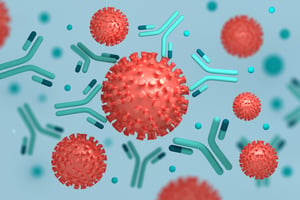Share this
how is antibody testing useful in the COVID-19 pandemic?
by Neoteryx Microsampling on Jul 12, 2021 9:00:00 AM
 During the first year of the coronavirus pandemic, health officials focused on detecting active cases of COVID-19 infection with PCR testing using nasopharyngeal swabs. Some research groups studied SARS-CoV-2 antibodies in an effort to learn more about the virus and how to develop vaccines that could protect us against it.
During the first year of the coronavirus pandemic, health officials focused on detecting active cases of COVID-19 infection with PCR testing using nasopharyngeal swabs. Some research groups studied SARS-CoV-2 antibodies in an effort to learn more about the virus and how to develop vaccines that could protect us against it.
How Is Antibody Testing Useful Once Vaccines Are Available?
Although many people have now received COVID-19 vaccinations and our communities are reopening, researchers still need to gather information about SARS-CoV-2 antibodies and immunity. The scientific community still doesn’t know exactly how long vaccine-induced immunity lasts or how potent it is compared to natural immunity. To gather more specific information, scientists are collecting blood samples and conducting serology studies to investigate SARS-CoV-2 antibodies and better understand how much protection they provide against the SARS-CoV-2 virus. This information will help them understand our vulnerability to reinfection and how to design an appropriate timeline for booster shots that will extend our protection.
An early serology study of blood samples from people who'd recovered from COVID-19 illness was conducted in 2020 by scientists at the University of Auckland in New Zealand. The Auckland researchers found that post-infection IgG antibodies had a neutralizing effect on the SARS-CoV-2 virus and would likely confer immunity for up to 8 months. Future studies of these IgG antibodies and the various immune responses of previously infected vs. vaccinated people will provide more information on how best to immunize people against this virus and its variants to end the pandemic.
Remote Microsampling in Seroprevalence Studies
Throughout 2020, directives to shelter in place made it difficult to conduct serology testing using traditional methods. Many scientists relied on remote blood microsampling for studies conducted during social distancing restrictions in 2020 because with this approach people can self-collect their samples at home and mail them in. This makes it the perfect approach to conducting the COVID-19 antibody testing we need to reach our public health goals.
Using Mitra® devices based on VAMS® technology, study participants can collect their own blood samples at home by following a simple process that is simple for anyone to do, as follows:
- Pierce a finger tip with the tiny lancet included in a Mitra® Collection Kit
- Apply the absorbent tip on the end of the included devices to the blood spot until the tip cannot hold any more fluid
- Repeat this process 1-3 more times until each white tip appears fully red
The resulting samples provide a fixed-volume specimen every time and can be packed in their container and and mailed back to the lab for analysis.
Moving Forward Using Antibody Testing
Using microsamples for antibody testing, researchers can glean useful information about the type and level of SARS-CoV-2 antibodies found in blood samples.
For instance, antibody studies have shown that mRNA vaccines do not produce an immune response against the SARS-CoV-2 nucleocapsid protein. Instead, they provoke a response against the virus’ spike protein receptor-binding domain (RBD). This key difference may be responsible for different degrees of immunity between vaccinated individuals and those who previously had COVID-19, the infection caused by SARS-CoV-2. Researchers are also using blood samples to investigate the immunity timeline--how long do antibodies provide protection?
This and other antibody-related questions are still under investigation. There is some evidence suggesting that antibodies raised naturally in response to a COVID-19 infection may have a shorter half-life than those produced in response to vaccination, especially if the infected person was asymptomatic.
There is also some indication that vaccinated people who were previously infected with COVID-19 have a heightened immune response after vaccination than vaccinated people who were never infected. Further study of these different responses in the population will tell us a lot about how to protect individuals moving forward, including when they need to be vaccinated, when they need a booster shot, and whether or not they face an increased risk of side effects from vaccines.
Using Antibody Testing to Manage a Pandemic
Post-vaccination infection with the SARS-CoV-2 virus should be a rare event, but it can and does happen occasionally. Further, the longer this virus circulates within the global community, the more likely it is to mutate into variants for which current vaccinations may be less effective.
Contact tracing can help as we move forward with reopening efforts. For example, if a case of COVID-19 crops up in a population that was thought to be fully vaccinated, portable Mitra® devices can be used to efficiently collect blood samples from the infected individual and all their contacts. From there, scientists can analyze the blood samples to identify the presence of either active virus or SARS-CoV-2 antibodies in each contact. The presence of SARS-CoV-2 antibodies would indicate that an individual was vaccinated or recovered from a previous infection. This type of sampling for contact tracing would help identify the source of the new infection, which would indicate who should isolate in order to contain the spread of contagion. Contact tracing helps determine details such as how and where these vaccinated individuals contracted the new infection and how many of their vaccinated contacts were also infected. This information can help scientists identify "breakthrough" infections and also understand who was resistant to a new COVID-19 infection and why.
Serology studies with a focus on antibody testing help determine the rate at which COVID-19 is spreading within a population. High rates of transmission indicate that collective immunity may be waning or that a new variant may be circulating that is resistant to current vaccines. If this is the case, serology studies would help scientists develop booster shots that could be distributed according to a timeline that would most effectively boost immunity in a given population.
Policymakers can also use antibody data to guide decision-making regarding when it is appropriate to reinstate or lift safety measures such as social distancing and mask-wearing requirements, safeguarding public health as a way to transition out of the coronavirus pandemic.
Learn more about remote microsampling for antibody testing and other infectious disease studies:

Share this
- Microsampling (206)
- Research, Remote Research (119)
- Venipuncture Alternative (105)
- Clinical Trials, Clinical Research (83)
- Mitra® Device (73)
- Therapeutic Drug Monitoring, TDM (51)
- Dried Blood Spot, DBS (39)
- Biomonitoring, Health, Wellness (30)
- Infectious Disease, Vaccines, COVID-19 (24)
- Blood Microsampling, Serology (23)
- Omics, Multi-Omics (21)
- Decentralized Clinical Trial (DCT) (20)
- Specimen Collection (18)
- Toxicology, Doping, Drug/Alcohol Monitoring, PEth (17)
- Skin Microsampling, Microbiopsy (14)
- hemaPEN® Device (13)
- Preclinical Research, Animal Studies (12)
- Pharmaceuticals, Drug Development (9)
- Harpera Device (7)
- Industry News, Microsampling News (5)
- Antibodies, MAbs (3)
- Company Press Release, Product Press Release (3)
- Environmental Toxins, Exposures (1)
- July 2025 (1)
- May 2025 (1)
- April 2025 (2)
- December 2024 (2)
- November 2024 (1)
- October 2024 (3)
- September 2024 (1)
- June 2024 (1)
- May 2024 (1)
- April 2024 (4)
- March 2024 (1)
- February 2024 (2)
- January 2024 (4)
- December 2023 (3)
- November 2023 (3)
- October 2023 (3)
- September 2023 (3)
- July 2023 (3)
- June 2023 (2)
- April 2023 (2)
- March 2023 (2)
- February 2023 (2)
- January 2023 (3)
- December 2022 (2)
- November 2022 (3)
- October 2022 (4)
- September 2022 (3)
- August 2022 (5)
- July 2022 (2)
- June 2022 (2)
- May 2022 (4)
- April 2022 (3)
- March 2022 (3)
- February 2022 (4)
- January 2022 (5)
- December 2021 (3)
- November 2021 (5)
- October 2021 (3)
- September 2021 (3)
- August 2021 (4)
- July 2021 (4)
- June 2021 (4)
- May 2021 (4)
- April 2021 (3)
- March 2021 (5)
- February 2021 (4)
- January 2021 (4)
- December 2020 (3)
- November 2020 (5)
- October 2020 (4)
- September 2020 (3)
- August 2020 (3)
- July 2020 (6)
- June 2020 (4)
- May 2020 (4)
- April 2020 (3)
- March 2020 (6)
- February 2020 (3)
- January 2020 (4)
- December 2019 (5)
- November 2019 (4)
- October 2019 (2)
- September 2019 (4)
- August 2019 (4)
- July 2019 (3)
- June 2019 (7)
- May 2019 (6)
- April 2019 (5)
- March 2019 (6)
- February 2019 (5)
- January 2019 (8)
- December 2018 (3)
- November 2018 (4)
- October 2018 (7)
- September 2018 (6)
- August 2018 (5)
- July 2018 (8)
- June 2018 (6)
- May 2018 (5)
- April 2018 (6)
- March 2018 (4)
- February 2018 (6)
- January 2018 (4)
- December 2017 (2)
- November 2017 (3)
- October 2017 (2)
- September 2017 (4)
- August 2017 (2)
- July 2017 (4)
- June 2017 (5)
- May 2017 (6)
- April 2017 (6)
- March 2017 (5)
- February 2017 (4)
- January 2017 (1)
- July 2016 (3)
- May 2016 (1)
- April 2016 (2)


No Comments Yet
Let us know what you think